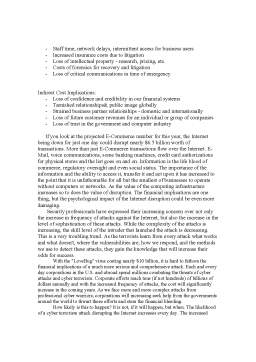Extras din referat
The current era has seen more rapid and extensive change than any time in human history. Consequently, we are living in a society that is increasingly dependent upon information technology. However, whilst technology can deliver a number of benefits, it also introduces new vulnerabilities that can be exploited by persons with the necessary technical skills. Hackers represent a well-known threat in this respect and are responsible for a significant degree of disruption and damage to information systems. However, they are not the only criminal element that has to be taken into consideration. Evidence suggests that technology is increasingly seen as potential tool for terrorist organizations. This is leading to the emergence of a new threat in the form of ‘cyber terrorists’, who attack technological infrastructures such as the Internet in order to help further their cause.
There is considerable debate about whether cyber-terrorism poses a serious threat to society. Although much has been dramatized in the popular media, there is legitimate danger Currently, computer networks are attacked and compromised daily because of the security's inability to keep pace with the growth of connectivity and because of readily available hacking tools and techniques. Because most critical infrastructure is networked, it is at risk. Although many of the daily invasions are hackers trying to get in just to see if they can, acts of vandalism, or denial-of-service attacks, individuals are gaining access to sensitive information. The real danger of cyber-terrorism, however, lies in the computer's use as both a terrorist tactic and a force multiplier.
Analysts have been saying for some time now that the new terrorism depends
on the information revolution and its technologies. Indeed, terrorism has long been about “information”—from the fact that trainees for suicide bombings are kept from listening to international media, through the ways that terrorists seek to create disasters that will consume the front pages, to the related debates about countermeasures that would limit freedom of the press, increase public surveillance and intelligence gathering, and heighten security over information and communications systems. Terrorist tactics focus attention on the importance of information and communications for the functioning of democratic institutions; debates about how terrorist threats undermine.
Of course, the increase in information, communication, and communication
technologies is not simply impacting terrorist groups. Information is the new lifeblood
of the international system. World politics today transcends simple inter-national relations, and much of the change has taken place as a result of the spread of information infrastructures (Luke 2001, 113). The information revolution is driving dramatic changes in political, diplomatic, military, economic, social, and cultural affairs. In the second half of the twentieth century, economically advanced countries made the shift into what has been termed the ‘information society’ or the ‘information age.’ The futurist Alvin Toffler has labeled this transition the ‘Third Wave’ (1980), suggesting that it will ultimately be as consequential as the two previous waves in human history: from hunter gatherer to agricultural societies, and from agricultural to industrial ones.
Because the term cyber-terrorism has been improperly used and overused, a clear understanding of the danger of cyber-terrorism must begin with a clear definition.
If you ask 10 people what ‘cyber-terrorism’ is, you will get at least nine different answers.
The term cyber-terrorism is becoming increasingly common in the popular culture, yet a solid definition of the word seems hard to come by. While the phrase is loosely defined, there is a large amount of subjectivity in what exactly constitutes cyber-terrorism. Business, government and industry have all become addicted to information. Their reliance on information creates opportunities for terrorism. Imagine a day without the Internet. What would the impact be? Just what is considered to be cyber terrorism?
Barry Collin, a senior research fellow at the Institute for Security and
Intelligence in California, coined the term ‘cyber-terrorism’ in the 1980s. The concept
is composed of two elements: cyberspace and terrorism. Cyberspace may be conceived of as “that place in which computer programs function and data moves”(Collin 1996). Terrorism is a less easily defined term. In fact, most scholarly texts devoted to the study of terrorism contain a section, chapter, or chapters devoted to a discussion of how difficult it is to define the term. In this paper, I will employ the definition of terrorism contained in Title 22 of the United States Code. That statute contains the following definition: The term ‘terrorism’ means premeditated, politically motivated violence
perpetrated against non-combatant targets by sub-national groups or clandestine agents, usually intended to influence an audience. Combining these definitions results in the construction of a narrowly drawn working definition of cyber-terrorism as follows:
Preview document
Conținut arhivă zip
- E-Commerce.doc













